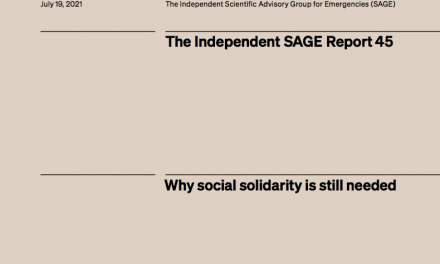Aims of this Consultation (the report can be read here)
At this critical stage of the pandemic, an effective COVID‐19 Find, Test, Trace, Isolate and Support (FTTIS) programme is essential if we are to recover our economy, protect livelihoods and secure longer‐term wellbeing and health provision for all.
This consultation document does not address when the current lockdown restrictions should be eased, although the members of Independent SAGE join official SAGE, NHS leaders, and many others in their concerns that this is happening too quickly. Reasons include the current level of infection, evidence that the pandemic is only just under control, and is probably not yet in some parts of the country, and the continued lack of preparedness.
Instead, we examine what is needed to put in place a robust FTTIS system, which the existing system is not, and what is needed to develop the trust in that system to ensure that it is accepted by the public.
We therefore aim to highlight the key practical steps for the rapid implementation of an FTTIS system which is embedded, sustainable, and can provide a long‐term response to future waves on infection. We welcome views and comments on this set of proposals, and how best to rapidly undertake a wide-ranging systems analysis, identifying all of the elements that need to be in place for the system to work and the lines of communication and accountability that connect them.
We also believe it is imperative to re‐build trust in an FTTIS system and welcome:
- suggestions from those who are responding to the pandemic, providing services, as to how they believe that trust can be restored, with evidence of any lessons learned.
- the views of the public, and especially those representing groups that have experienced a disproportionate loss of trust, such as those from BAME communities and those with chronic conditions, of what needs to change
High level recommendations
- TRUST: The success of a FTTIS system is based on trust, requiring accountability mechanisms to review evaluation and other evidence, advise on and oversee implementation, and conduct real‐ time scrutiny of emerging data and policy formulation. Effective community engagement is essential to discuss implementation, problems and solutions, working in partnership with local and national groups.
- LOCAL: The most effective implementation of FTTIS is led locally, coordinated by Directors of Public Health. This should be embedded as much as possible within existing networks, and utilise Local Authority and NHS actors such as health commissioners, primary care, local hospital laboratories, school nurses and environmental health officers. This will ensure a robust system in place for future upsurges in infection, and for decision making.
- DATA: A rigorous system must be implemented to embed the FTTIS data flows as much as possible within existing NHS, local authority and PHE data structures, with real time access to enable local response. It is important to provide data dashboards for the community and ensure appropriate governance and safeguards for privacy and data misuse, to ensure trust and engagement. The future application of m‐health systems such as apps must be implemented within such a framework.
- ISOLATE and SUPPORT: This is the critical component of FTTIS if reductions in infection spread are to be realised. There must be facilities available for such isolation, material support including food and finance, and appropriate guarantees from employers, to ensure that those in isolation are not disadvantaged.
- KEY PERFORMANCE INDICATORS (KPI). A set of key performance indicators should be reported weekly, including data that are timely, relevant, and useful to key stakeholders, at a sufficient level of granularity to support local decision‐making. Suggested indicators are set out in this report. These data should be subject to community feedback.
The report can be read here.


